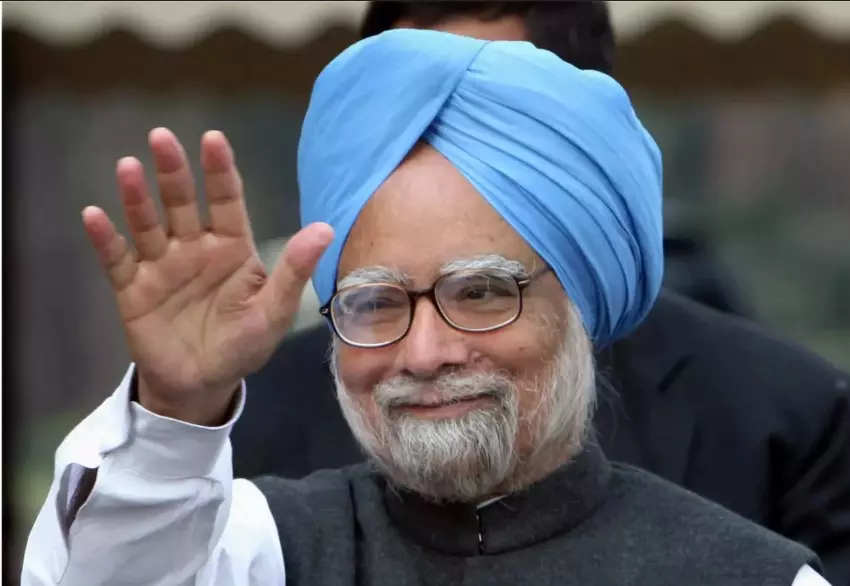Dr Manmohan Singh's reforms redefined India's trajectory as a rising global power

New Delhi: Former Prime Minister Dr Manmohan Singh, who breathed his last on Thursday night, had a legacy of economic reforms in India. Dr Singh’s historic reforms, not only rescued the country from near bankruptcy, but also redefined its trajectory as a rising global power. Dr Singh kick-started his crucial economic reforms and placed the country on the global map in 1991.
Dr Manmohan Singh, an Oxford scholar and administrator, had served as secretary finance as well as member secretary of the then Planning Commission (now Niti Ayog) prior to his appointment as governor in the Reserve Bank of India (RBI) from 1982-1985 and then Union finance minister from 1991-1996. During his tenure as RBI chief, comprehensive legal reforms were carried out related to the banking sector and a new chapter introduced in the RBI Act and the urban banks department was set up.
After his tenure in the bank, he served in various capacities before being appointed Union finance minister in Narsimha Rao’s government and announced path breaking reforms in the July 24, 1991 Budget as well. His tenure as finance minister was notable for the fact that he heralded liberalisation and comprehensive reforms in India. Besides, he also dismantled the licence raj for many industries and also gave the message that foreign investment should be welcomed.
This visual narrative chronicles his transformative journey from the early 1990s, highlighting his pivotal roles as a Union minister and RBI governor, to his tenure as Prime Minister from 2004 to 2014. Before commencing his career in politics, Dr Singh had served the RBI as 15th governor from 16 September 1982 to 14 January 1985. Former Indian Prime Minister PV Narsimha Rao chose Dr Singh as finance minister in his cabinet from June 21, 1991 to 16 May 1996.
In the 1991 Budget, Dr Singh opened up the mutual fund space to the private sector and removed interest rate restrictions on convertible and non-convertible debentures floated in the capital market. Corporate India also owes much of its freedom to Dr Singh for his liberalised reforms of the policy regime for foreign direct investment in the country. It was a very challenging period when India was passing through a forex crisis with its reserves barely able to cover two weeks of imports and the country’s fiscal deficit hooting up to 8 percent of its GDP.
Dr Singh had also sought to give the message that wealth is not bad, though the wealthy should also use it for social purposes. “For the creation of wealth, we must encourage accumulation of capital. This will inevitably mean a regime of austerity. We have also to remove the stumbling blocks from the path of those who are creating wealth… Those who create it and own it, have to hold it as a trust and use it in the interest of the society, and particularly of those who are under-privileged and without means,’’ he had said while delivering the Budget speech of 1991.
REACTIONS:
Recalling Dr Singh's contributions as the architect of India's economic reforms, RBI Governor Sanjay Malhotra said on Friday that India’s economic reforms have left an indelible mark. “I am deeply saddened by the passing away of former Prime Minister, Dr. Manmohan Singh, a visionary economist and former RBI Governor. His contributions as the architect of India’s economic reforms have left an indelible mark. RBI joins the nation in mourning this huge,” Mr. Malhotra said in a post on X.
Former RBI governor Urjit Patel also said Dr Singh was rightly described as the architect of India's reforms and that he was very supportive of the central bank, having been at its helm himself. “What struck me is that he was as up-to-date as anyone could be. One always came away with a feeling that I perhaps learned more than he did from our conversation. He really was an outstanding professional in all the various roles that he played in the life of our country,” Patel said.
Former RBI governors like Raghuram Rajan and Duvvuri Subbarao, also paid glowing tributes to Manmohan Singh’s pivotal role in shaping India’s economic trajectory. While Rajan highlighted Dr Singh’s bold reforms during the 1991 economic crisis, crediting him with laying the foundation for three decades of sustained economic growth, Subbarao identified his contribution to the transformative impact of the 1991 economic reforms on India’s middle class.
“He had also then famously cited Victor Hugo who said, ‘no power on earth can stop an idea whose time has come.’ This example was to tell that India will emerge as a major economic power in the world. For corporate India and the country which has now come a long way from those days, his words “India is now wide awake. We shall prevail. We shall overcome’’, continues to resonate,” Rajan said.
“Imports like televisions and refrigerators were prohibitively expensive due to tariffs as high as 250 per cent. The liberalisation of imports, along with the removal of industrial licensing and a shift away from reliance on public sector investment, were key pillars of these reforms. These measures not only made consumer goods more accessible but also bolstered private sector participation, integrating the nation’s economy and driving growth across regions,” Subbarao said.
Former World Bank chief economist Kaushik Basu, who was chief economic adviser (CEA) to the government of India from 2009-12 also said that Dr Singh’s sharp intellect, innate modesty, and personal integrity— qualities rarely found in politics— will be remembered as one of the greatest political leaders not only in India but also globally. “He was a combination of sharp intellect, innate modesty and personal integrity, which is rare in politics. The reforms that Dr Singh initiated in the early 1990s transformed India from a struggling developing nation to one of the world's fastest-growing economies,” Basu said.

